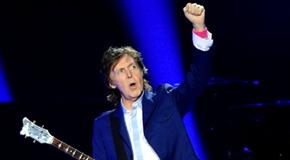Features
McCartney Reflects On Yesterday, Today And Tomorrow
Interviewed recently at his midtown Manhattan office suite, he seems as boyish and light-footed as he was on stage decades ago for “The Ed Sullivan Show,” his manner informal, his build slender and well suited for jeans and a form-fitting sweater. He’s so young in his thoughts that he will dismiss the idea of a memoir as a project for his 70s, catch himself, and dismiss a book again as if time were still a distant bother.

Memories can be found in his otherwise bright and modern office, from a small black and white photo taken of him by his late wife, Linda, to the abstract paintings by his late friend Willem de Kooning. But he is here to promote the present, a score he completed for Destiny, a first-person shooter game for PlayStation and Xbox. The premise was intriguing partly because he is no more adept at video games than he is at reading sheet music (many rock stars can’t), and because the closing song he wrote, the ballad “Hope for the Future,” captures how he looks upon the world.
“I thought, ‘Seeing it’s a shoot-em-up game, I will be the optimistic hope for the future,’“ he says. “I will write something that sums up that side of the game.”
Writing songs on commission has been a pastime for McCartney since his years with the Beatles, when he composed the soundtrack for the 1966 film “The Family Way.” He likes the challenge of fitting a piece of music into a pre-existing narrative, comparing it to solving a crossword puzzle. One of his favorite tests was coming up with the theme song, a top five solo hit for McCartney, for the 1973 James Bond thriller “Live and Let Die.”
“It’s like ‘Live and Let Die,’ how the hell am I am going to write a song like that?” he says. “I can’t change the title. I can’t say I’m going to write a song, ‘Live and Let Fish.’ Then you sit around and go, ‘OK, “You used to say ‘Live and let live’ …’“ You work out a whole hypothesis.”
McCartney doesn’t think of himself as a personal writer in the tradition of his former collaborator, John Lennon. His songs often are less about his own life than about assuming a mood or identity. So he is as comfortable declaring “Hope for the Future” as he was confiding “I believe in yesterday,” as likely to imagine a lonely old woman (“Eleanor Rigby”) as to put in a word for “Silly Love Songs.” At times he takes on social causes, or at least tries. Having written “Blackbird” for the civil rights movement in the ‘60s, he attempted a song about police killings in Ferguson, Missouri, and New York City.
“I was thinking recently about all these protests in New York and around the country. I thought it would be great to put something down about that, just to add my voice to the thousands of people walking in the streets,” he says. “I thought it through and it just didn’t come easily. I’m not giving up on it, but it didn’t come easily, whereas some other emotions might come easily to me.”
While forever a Beatle in the hearts of millions, he keeps his mind open to all moments. He sends out tweets on occasion and texts his friends, although the fine points of Spotify are beyond him (that’s what lawyers are for). Sam Smith is a favorite young singer, and McCartney recently attended a Jay Z/Kanye West concert, found it “amazing” and praised their lyrics as “modern poetry.”
McCartney makes frequent visits to his native Liverpool, where he helped found The Liverpool Institute for Performing Arts on the site of the school he and George Harrison attended as boys. And he keeps in close touch with family members and past associates, enjoying local gossip or joking with Beatles producer Sir George Martin. Loved ones speak to him from beyond. McCartney finds himself remembering his late father’s pet expressions, like “Get stripped, you’re on next,” meaning asking a guest to take his coat off. While working on a song – the melodies come to him constantly – he might summon the spirit of Lennon.
“I imagine myself back into a room with John, and I’ll think (about a lyric), ‘Ugh, that’s no good.’ And I’ll imagine him saying, ‘No, can’t do that.’ So I’m using him as a sort of judge of what I’m doing,” McCartney says.
History – the Beatles, England, childhood – follows him everywhere, whether to a White House party where young friends of the Obamas gushed like the kids of old, or a birthday party in Tokyo for his current wife, Nancy. The entertainment was Queen and Beatles tribute bands.
“I had a kind of very emotional moment when we were sitting there – it could have been the alcohol,” he says. “And I’m thinking, ‘My God.’ The power of British music finally came home to me. All the way across the world, in Japan, these guys were breaking down Queen songs, and the others Beatles songs. They were replicating them amazingly. They got all the orchestra parts on ‘I Am the Walrus.’ They may not even speak the language that well, but they speak these songs beautifully.
“I should know that we’ve had that effect, because it’s historically true. But it doesn’t always come home to you in quite the way it did that night. I was welling up and I was (thinking) ‘I can’t well up to a Queen tribute band.’“